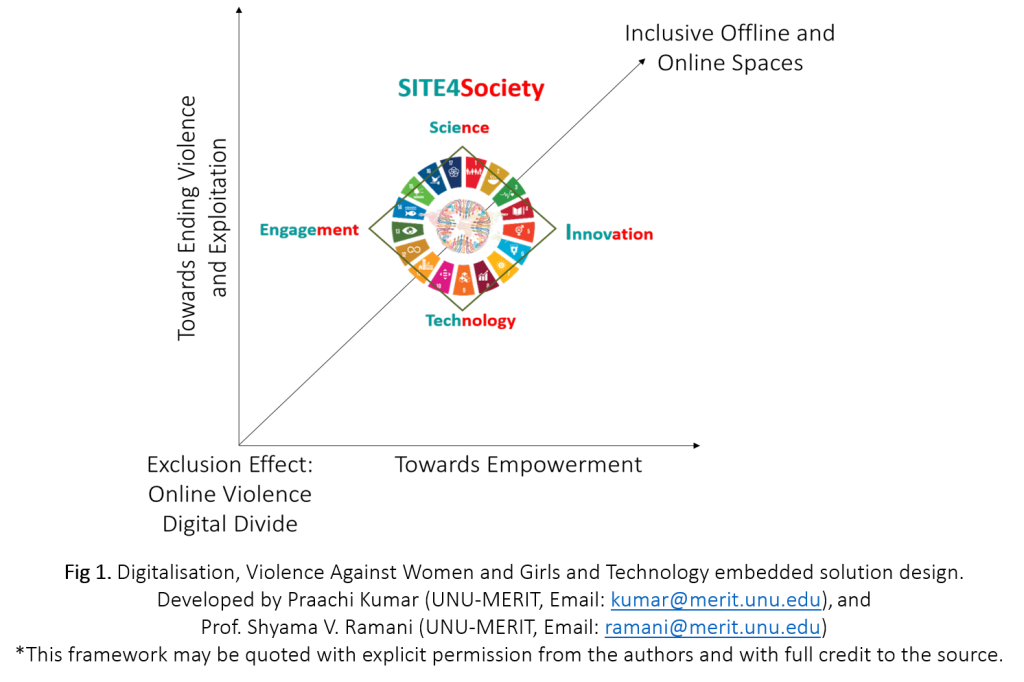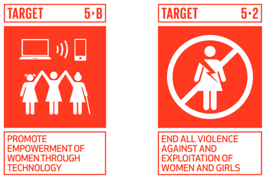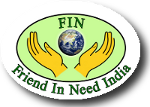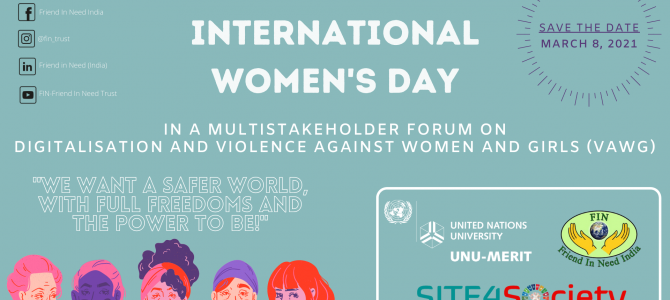Digitalisation and Violence Against Women and Girls (VAWG)
Digitalisation for SDG 5.2 (End Violence):
Exploring the Implications, Opportunities and Threats
Register for this event now
You can find the event brochure with details on the speakers’ profiles and the event programme here.
Even today, statistics indicate that one in three women (Devries et al., 2013) and one in four adolescent girls is likely to experience physical or sexual violence (UNICEF, 2014) . The lives of girls and women are undermined by violence, harm, neglect, exploitation, and abuse. On the one hand, this is a serious violation of women’s rights, capabilities, and wellbeing and on the other hand, it also severely undermines women’s freedom and agency. Researchers at United Nations University- MERIT (UNU-MERIT), studying the role of technology adoption and diffusion, propose that digitalisation can serve both as an enabler of or barrier to violence against women and girls (Fig. 1) and therefore requires a deeper examination.
 Change agents all over the world are employing innovative digital ways to address both online and offline violence against women, signalling hope for a safer world. As a result of digitalisation, they are also engaging more, and with more people – both men and women. Moreover, social media platforms offer a new, limitless ground for activism and discussion of issues surrounding VAWG.
Change agents all over the world are employing innovative digital ways to address both online and offline violence against women, signalling hope for a safer world. As a result of digitalisation, they are also engaging more, and with more people – both men and women. Moreover, social media platforms offer a new, limitless ground for activism and discussion of issues surrounding VAWG.
Unsurprisingly, these spaces themselves are rarely safe and can quickly become a breeding ground for malicious crimes, especially against women and girls. While being better connected surely elevates participation, it also presents its own challenges, such as new and injurious forms of victimisation.
The imbalanced distribution of artifacts (e.g. smartphones) and skills (to handle them) has also reinforced digital divides especially between men and women. A serious digital divide means that women cannot access channels and resources that could reduce their risk of experiencing violence. For instance, during the coronavirus pandemic, this divide has created a deeper gulf in access to social services in domestic violence.
Thus, on International Women’s Day 2021, we will discuss the following burning questions with experts from academia, governance and the social sector:
- What are the opportunities offered by digitalisation to make the world a safe place for Women and Girls while ensuring their full freedoms and agency? What are the threats to women’s safety and freedoms being introduced by digitalisation and how can they be addressed?
- How can our efforts steer pathways towards safe online and offline spaces?
- Where are we on the SITE curve (Fig. 1), and which direction are we moving towards?
- Particularly, what can be the role of the SITE instruments (namely science, innovation, technology and engagement) in advancing the state of safety for women and girls without compromising on their freedoms?

Join us as we discuss Sustainable Development Goal 5b and 5.2, with its ambition to enhance the use of enabling technologies to promote the empowerment of women. Let us understand the causes of Violence Against Women better and design solutions to give us hope in an increasingly digitalised world!
On this International Women’s Day, March 8, 2021, Friend In Need India Trust joins hands with SITE4Society at UNU-MERIT from The Netherlands, to explore the different dimensions of online Violence Against Women and solution designs melding Science, Technology, Innovation and Engagement (SITE).
Register for this event now
For queries related to the event please contact: fintrust.india@gmail.com
About Our Partnering Organisations
The United Nations University – Maastricht Economic and Social Research Institute on Innovation and Technology (UNU-MERIT) is a research and training institute of United Nations University based in Maastricht in the south of the Netherlands.
The institute, which collaborates closely with Maastricht University, carries out research and training on a range of social, political and economic factors that drive economic development in a global perspective. Special emphasis is on the process of technological change and innovation, including the governance of science and technology and on factors limiting the access to knowledge; on (public) policy analysis and evaluation; on the social aspects of growth and development, in particular the policy challenges posed by low levels of development including the limitations and possibilities for social security and other social policies; and on the relationship between global development and migration.
“SITE4Society” was initiated by Prof. Shyama V. Ramani to create dialogue and cooperation between students, researchers and other community stakeholders on pathways to attain the Sustainable Development Goals. Its activities have been developed in collaboration with different groups of academics and students across the globe, with the core team being in UNU-MERIT. Its mission is to mobilize academics and students to contribute to making the world a better place via research, action-research, workshops, training programmes and publication briefs. The focus is on the SITE variables i.e. science, innovation, infrastructure, technology and engagement (via entrepreneurship and/or governance) that can serve the National Missions of countries and attainment of the Sustainable Development Goals.



